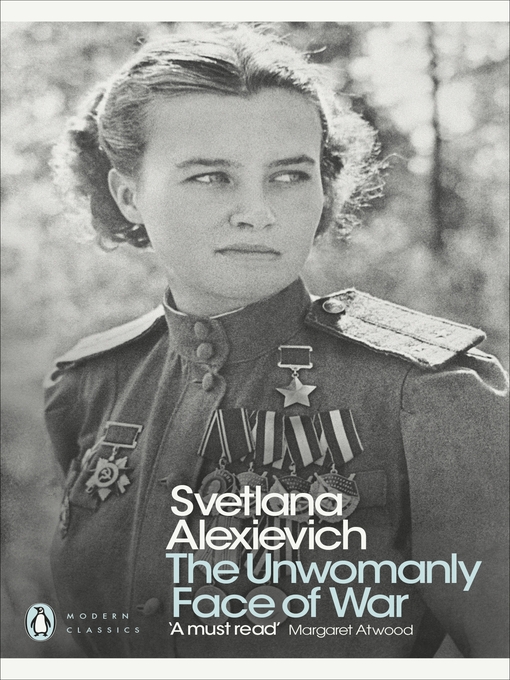The long-awaited translation of the classic oral history of Soviet women's experiences in the Second World War - from the winner of the Nobel Prize in Literature
Bringing together dozens of voices in her distinctive style, The Unwomanly Face of War is Svetlana Alexievich's collection of stories from Soviet women who lived through the Second World War: on the front lines, on the home front, and in occupied territories. As Alexievich gives voice to women who are absent from official narratives - captains, sergeants, nurses, snipers, pilots - she shows us a new version of the war we're so familiar with, creating an extraordinary alternative history from their private stories.
Published in 1985 in Russia and now available in English for the first time, The Unwomanly Face of War was Alexievich's first book and a huge bestseller in the Soviet Union, establishing her as a brilliantly revolutionary writer.
-
Creators
-
Series
-
Publisher
-
Release date
July 25, 2017 -
Formats
-
OverDrive Read
- ISBN: 9780141983547
- File size: 1195 KB
-
EPUB ebook
- ISBN: 9780141983547
- File size: 1237 KB
-
-
Languages
- English
-
Reviews
-
Publisher's Weekly
March 6, 2017
“I write not about war, but about human beings in war,” explains Nobel-laureate Alexievich (Secondhand Time) in this lyrical, elegant volume. “I write not the history of war, but the history of feelings. I am a historian of the soul.” Originally published in 1985 and newly translated by Pevear and Volokhonsky, the work was inspired by Alexievich’s postwar childhood memories of the women in her home village and their stories of WWII. Alexievich traveled through the Soviet Union for years interviewing hundreds of other women, collecting a haunting cacophony of almost-forgotten voices. For these women, who joined the Red Army as snipers, medical personnel, riflemen, foot soldiers, etc., war wasn’t about generals and military equipment. “Women’s stories are different and about different things,” Alexievich reveals. “There are no heroes and incredible feats, there are simply people who are busy doing inhumanly human things.” Alexievich groups the interviews into chapters according to women’s perceptions about their service: “I Don’t Want to Remember...,” “They Awarded Us Little Medals...,” “They Needed Soldiers... but We Also Wanted to Be Beautiful....” Though political contexts have changed, Alexievich’s first book remains as soulful as ever. -
Publisher's Weekly
September 4, 2017
Speaking with Slavic accents, narrators Emelin and Shmulenson divvy up the many stories of Soviet women serving in the military and resistance movements of World War II in the audio edition of this English translation of Nobel Prize–winner Alexievich’s oral history. There are chilling tales of girls witnessing—and perpetrating—atrocities and then wondering how they will be able to return home and have families of their own. And there are stories of sharpshooters, surgeons, and scouts performing heroically but worrying about their femininity and even their humanity. While the audio format is seemingly a natural fit for an oral history, it’s easy to lose track of individuals in the accounts of hundreds of women. Emelin and Shmulenson do their best to provide unique voices for different women and they state the name of each before reading her story, but listeners can’t refer back to those names as easily as readers could. While the book presents numerous women’s experiences in the war, the stories start to blend together with only two actors providing the voices of hundreds of women. A Random House hardcover.
-
Formats
- OverDrive Read
- EPUB ebook
subjects
Languages
- English
Loading
Why is availability limited?
×Availability can change throughout the month based on the library's budget. You can still place a hold on the title, and your hold will be automatically filled as soon as the title is available again.
The Kindle Book format for this title is not supported on:
×Read-along ebook
×The OverDrive Read format of this ebook has professional narration that plays while you read in your browser. Learn more here.

